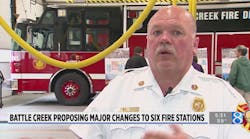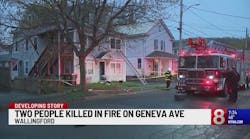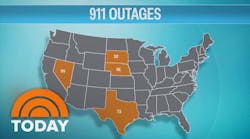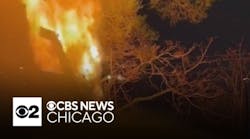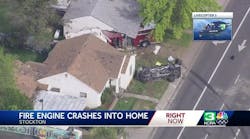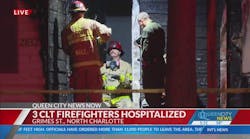In the quiet Wisconsin woods along the western shore of Lake Michigan, some of the brightest fire service leaders assembled in a mansion designed by Frank Lloyd Wright to produce Statements of National Significance to the Fire Problem in the United States. One of the treatise's 12 points was the need to elevate the fire service to professional standing through education. It delineates, "A systematic and deliberate educational program leading to a broad knowledge base which is acceptable to the academic community is the surest approach to professionalization."
That was 44 years ago.
The first Wingspread Conference report might not be current reading for today's fire service leaders, but they are aware of the educational suggestions nonetheless. Many of its recommendations remain unresolved.
FLORIDA
The superintendent of the Florida State Fire College in Ocala sees an opportunity to reach out to firefighters, not only in the tried-and-true training aspects, but with higher education.
"It's my view that about 30% of the fire service is not being touched by educational programs in Florida," says Superintendent Barry Baker. "Really, if you look at battalion level and above, with the exception of technical courses, we're not reaching them, yet that is our intent. I think quite frankly the fire service is very focused on highly technical and operationally oriented classes. Out of necessity, that is what we do. But as we get to leadership and some of the soft skills found in formal education, we have not been as strong as we need to be. I talk often of taking the fire service from an avocation to a profession and that takes some discipline."
Baker sees higher education as a continuum of vocational training and believes the fire service might not weather economic downturns without it.
"If you look at the fire service in general, the first attempt to focus on something beyond the occupational training was the initiation of The ProBoard (the National Board on Fire Service Professional Qualifications). It creates portability from one part of the county to another. There is a resurgence in making something that is portable and more professional."
According to The ProBoard's website (www.theproboard.org), the organization's mission is to, "Establish an internationally recognized means of acknowledging professional achievement in the fire service and related fields."
"The nature of our business…we promote from within for the most part," Baker says. "If we don't hire people with (degrees) or get them educated, we end up with what's best of what's left. Today is probably more demanding than I have ever seen in my career, in terms of limited resources, and people being stretched to get all there is out of the funds available. I've been doing this for 45 years and I have not seen the lack of public support for the fire service that I am seeing today. Part is due to the economy, part is due to some perceptions, but the reality is we have to elevate the fire service. And what better way to do it than changing it from an avocation to a profession. You're not seeing professions beat up; you're seeing avocations beat up. If you want to change that, you need to raise your sights."
Baker and the state not only encourage collegiate participation, they reward those who attain degrees.
"At one point, a degree was desirable," Baker says. "Now, it is essential if you are going to advance in the fire service. The competition is keener and the challenges are getting greater. We meet with each student who goes through The State Fire College — from the most junior to the most senior — and make sure they understand the opportunities and necessity of (higher education)."
To reward Florida firefighters' educational accomplishments, the state provides supplemental compensation for degrees. According to Baker, "It is to encourage higher education in the fire service. We offer on a monthly basis those with an associate's degree $50 and those with a bachelor's degree $110. We have been discussing the idea of offering an incentive for a master's degree."
Julius Halas, director of the Division of the State Fire Marshal, whose job it is to oversee education and training in the state, sees the fire service's role expanding, something higher education greatly facilitates.
"In Florida, our domestic security grant funding comes through the emergency management function. One of the things I see — big picture — is reaching out to other disciplines, to have law enforcement, public health, fire, EMS. This all-hazard approach can be enhanced through this participation," which has a basis in education, he says. "It will only help our preparedness. It is a real value to the citizens of Florida."
On the west coast of Florida, Chief Mark Souders of the Bradenton Fire Department has good advice for firefighters pondering higher education.
"It used to be that getting a job required an associate's degree," he said. "Today, it's darn near the case to have a two-year degree to keep your job."
Souders, with 34 years of fire experience, is quick to counsel department members on the merits of college. His personal advice is a degree in public safety administration, he says, "which makes someone more marketable within emergency services. I advise them without fail to get the two-year degree in fire science."
Souders added, "I don't think the state would mandate a degree, but if you look at any job application, for executive level, a bachelor's degree is pretty much mandatory, even at a small department. A master's degree is preferred. A two-year degree or four-year degree is necessary to be competitive. I served on the board of the Florida Fire Chiefs. When I started on the board, a bachelor's was a high achievement. What I have seen, at least at the chief and executive level of fire departments, people are getting master's degrees. They are specializing. Jobs are getting tighter and those doing the hiring are being more selective, seeking degreed persons."
Souders' motivation for gaining a master's degree? "It was to have some measure of control of my professional destiny. If you work for somebody and you don't have a degree that allows you movement, then you're stuck in that position."
GEORGIA
The Peach State has a highly localized associate's degree program in fire science. Through its technical college system, roughly a dozen statewide programs deliver fire science and general education courses for firefighters. According to the system's website, "The Technical College System of Georgia is a unified system of technical education, custom business and industry training, and adult education programs. Our programs use the best available technology and offer easy access to lifelong learning for all Georgians. The system goal is to be an integral part of a seamless education process for Georgia in which students can transfer credits efficiently as they advance from secondary schools to technical colleges and to the university system."
And as Dave Wall, division director at the Georgia Public Safety Training Center, emphasizes, this localized approach is designed to meet the needs of counties or regions that the technical college system serves. His position is to run the state's training academy. Yet he is keenly aware of what is beyond the job's training aspects.
"As people progress through their ranks, they do need to attend higher education, whether technical enhancement or what some authors have referred to as the soft skills," Wall says. "The skills of being able to communicate clearly — writing, speaking — understand and synthesize information from multiple sources, learning ability, especially from different disciplines as human relations and budgeting. The importance of education is that it is not an end-all, but an integral part of becoming a fire officer.
Wall continues, "When I got my first fire chief's job in 1993, it was not because I had fire chief experience; it was because I had a master's degree in public administration. And I was not the first department head with a master's degree. I was the third or fourth. What that does is put you on a level playing field when you are a chief officer. You are competing for diminishing resources. The fire service, long steeped in history and tradition, tended to ignore that other public safety professionals were embracing higher education. Then fire leaders stood by and wondered why they were not getting an equivalent piece of the municipal pie. I say wonder no longer and become one of the peers."
Wall offers anecdotal evidence of the spread of higher education: "Ten to 15 years ago, if we asked a class of new officers how many of you were in college now, we would get one, two or three out of 25. Today when I do that, more than half of the class raises their hands. Why? Because more departments are now embracing it as a requirement."
Lisa Beck, curriculum program specialist for public health and public safety at the Technical College System of Georgia, agrees. "At any one time, we have 10–12 colleges that offer fire science courses statewide. They don't all offer the same things because it's up to the locality to determine what they need," she says. These associate-level degree programs do not have a direct ladder to baccalaureate courses at the state's colleges and universities, but opportunities do exist, she says.
"We have a standard curriculum all the way through the associate's degree," she says. "Our faculty then works locally to make sure we are meeting local fire department needs. If anything changes nationally where we need to update our curriculum, we make those changes immediately. We also revise our curriculum on a three-year cycle. We have looked at the FESHE (U.S. Fire Administration-inspired Fire and Emergency Services Higher Education Model) model, and each time we meet with faculty, it's having a bigger impact on our decisions."
NORTH CAROLINA
In North Carolina, Joseph Woodall found a challenge in Fayetteville State University's mandate to meet the divergent needs of a dispersed population. The solution: Woodall, who is an assistant professor in the Fire Science Program, helped to engineer an online baccalaureate program with a concentration in fire service management or fire investigation.
"It was impossible to bring people to campus, so I was hired to bring the program into service," says Woodall. "We have graduated more than 30 students since then, and are averaging an active base of 100 students. We're just about the right size for what we can handle. We are hearing very good feedback from state fire chiefs and the students." His program caters to those seeking more job responsibilities.
"Ninety-five percent of my students are working in the fire service, preparing for promotional opportunities," he says.
"As a result, the idea in the management side was to prepare them for administrative leadership positions," Woodall says. "We have a capstone course, a fire internship, which is flexible enough for the entry-level firefighter to the chief of the department. The goal is to provide them with a growth experience, a leadership responsibility…something that is beyond their current duties and responsibilities. This has created some very valuable opportunities for area fire departments, because there is always something (they envision) that needs to get done."
Two techniques Woodall uses in the online delivery are discussion questions and academic journals. "Students keep journals and discuss their experiences online," he says. "I am a big advocate of people learning in the online environment…it is especially ideal for a firefighter.
"I think higher education in the fire service is growing very rapidly. The timing was very good because when we really started gaining momentum, the advent of online education was maturing. This made it very advantageous to firefighters. It's one big barrier knocked down limiting access to higher education."
KENTUCKY
One university in Kentucky has a national presence in fire, safety and emergency management higher education. Eastern Kentucky University offers four degree programs: Occupational Safety, Fire Protection Administration, Fire, Arson and Explosion Investigation, and Fire Protection Safety Engineering Technology. Its students are local and from across the country.
According to Dr. Larry Collins, chair of the Department of Safety, Security and Emergency Management program in the College of Justice and Safety at EKU, the genesis and growth of these programs has much to do with the FESHE model.
"We have made some changes to the curriculum over the years," Collins says. "We have been a key part of FESHE and our curriculum is really derived from FESHE, although individual classes might not be titled the same. We came up with a list of what every fire manager should know, regardless of where they are in the country, and derived a series of courses that became the core of the associate's degree. From there, we began to build on that and now we have a bachelor's degree and a master's degree."
He continues, "I think it's very important for us (in the fire service) to transition into a profession. For us to be accepted and respected around the table with other governmental officials, we need to be professionals. That's not to say that traditional training is not important, because it is very important. I think the work of FESHE has a done a lot to standardize what we do as a profession."
In one area in particular, "recent landmark cases in fire investigation have underscored the need for education to testify on the witness stand. Before, it was just the number of years on the job and rank that could qualify you as an expert witness. Now, courts are asking where you received your formal education in fire, combustion, dynamics and analysis. All of it is coming together to raise the bar to become a professional," Collins explains.
Professional standing in the halls or city and county government also spurs the need for college degrees.
"It's what the city managers, the people who are making the decisions, expect," Collins says. "Higher education accentuates critical thinking, creative thinking and problem solving. It also allows us to understand that it's not just the fire service that is at the table, (but it also portrays) the whole picture of local government. It allows us to see ourselves as part of the team. We have alumni who come back and tell the students: 'You can be the best technical person there is and generate a technical report that is 100% accurate. But, if you do not have the grammar right…the report will discredit you.' "
EKU offers traditional brick-and-mortar classes as well as online delivery.
"The online programs are so flexible," Collins explains. "We take a full semester course and condense it into eight weeks. Yet the courses are comparable programs: The content does not change, nor do the instructors. I believe the online courses are actually harder than the on-campus variety."
As Patrick Giacobbe, a retired corporate training manager and new recruit to the staff at the Florida State Fire College reiterates:" (The Wingspread Conference Report) calls for professional status, increased mobility, career development. …I see the time for talking about higher education in the fire service is well past its prime. It's time for action."
PAUL SNODGRASS, a Firehouse® contributing editor, is a firefighter with the Sarasota County, FL, Fire Department and a former fire chief. He is on the faculty at the University of Florida and an adjunct fire science instructor at Hillsborough Community College in Tampa, FL, and Cogswell Polytechnical College in Sunnyvale, CA. Snodgrass holds a bachelor's degree in political science from Augsburg College and a master's degree in education from the University of Phoenix. He has been writing about, designing and teaching online courses since 2005. He can be contacted at [email protected].
